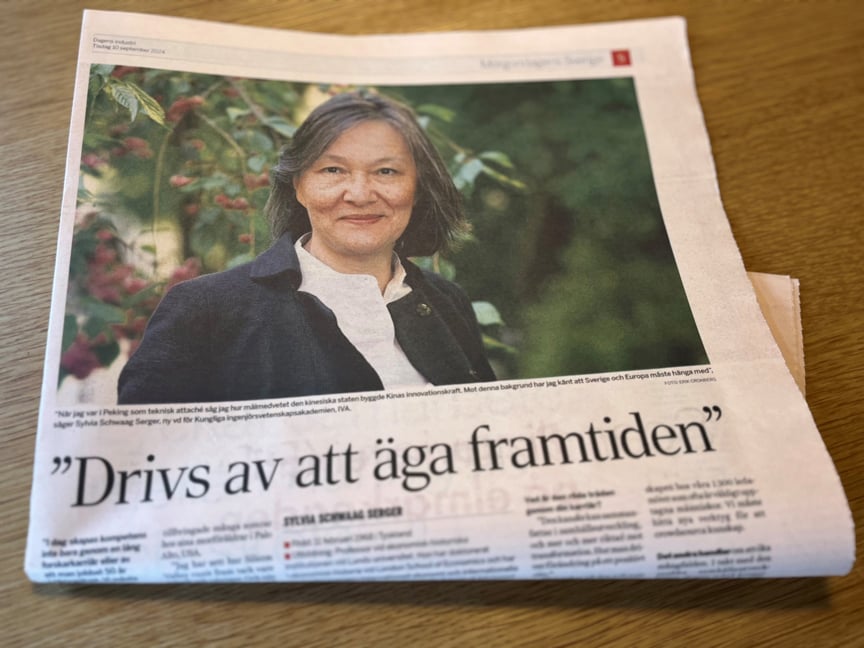She is set to transform the world’s oldest academy of engineering sciences
Today, Newspaper Dagens Industri publishes an interview with IVA's incoming CEO, Sylvia Schwaag Serger. Here you can read an excerpt from the interview about driving forces, choices and visions.

"Today, competence is not only created through a long research career or from working for 50 years in the business world. We must increase the breadth of our knowledge acquisition."
"I'm driven by acting and owning the future instead of letting it own us by waiting and hoping for the best," says Sylvia Schwaag Serger, who will take over as the new president of IVA in October, in the interview in DI.
"But I'm also quite aware that I could be wrong. Today there is a lot of uncertainty, but it should not inhibit one's drive."
With her own motley background, Sylvia Schwaag Serger is a bit of an odd bird in this context. She has Chinese roots on her mother's side, grew up in Germany and spent many summers with her grandparents in Palo Alto, USA.
"I have seen how Silicon Valley has grown thanks to technology and talent. And when I was in Beijing as a technical attaché, I saw how purposefully the Chinese state built China's innovation power. Against this background, I have felt that Sweden and Europe must keep up. It is not a matter of course that we will do so."
She came to Sweden at the age of 27 and got a job at the Ministry of Enterprise and Innovation, something she saw as the perfect introduction to her new homeland, even though she later discovered that Swedish industrial policy differed from the German one in which she had defended her thesis. She has run a think tank with a focus on research and innovation policy, been hired as a China and innovation expert by the European Commission, the OECD and the World Bank, and has been a member of Prime Minister Stefan Löfven's National Innovation Council, to name just a few of the merits on her long CV.
What is the common thread throughout your career?
"It can perhaps be summarized in social development, and more and more aimed at transformation. How to drive change in a positive way."
She points to the role that technology and engineering have played in building Sweden's prosperity in combination with wise economic decisions.
"It's IVA in a nutshell. IVA has been involved when important choices have been made in Sweden's technological development."
What is the next important choice that you and IVA will face?
"What sometimes keeps me awake at night are the four factors that characterize our existence today. It is the race between the United States and China for key technologies, the climate crisis that is becoming increasingly devastating for large parts of the world's population, the erosion of democracy and the risk of a large-scale war in Europe."
You call IVA a treasure, but how can IVA be modernised?
"I would like to find a new way to benefit from the knowledge of our 1,300 fellows, who are often very busy people. We need to find new tools to crowdsource knowledge.
The second is about increasing diversity. In line with the rapid development of society, skills are also created in a different way than before, not just through a long research career or having worked for 50 years in the business world," she says, giving the example of her own son.
" He is studying computer science and his feeling and perception of technology is incredibly valuable to me and is different from my generation's relationship with it. We need to broaden and rejuvenate the competence base."
She also wants to make IVA more visible internationally. For a small country like Sweden, the rapid pace of change is a major challenge. But if we are not at the forefront, we will not find our way to the negotiating table," says Sylvia Schwaag Serger.
Read the full interview published in DI 2024-09-10 here (in Swedish)
